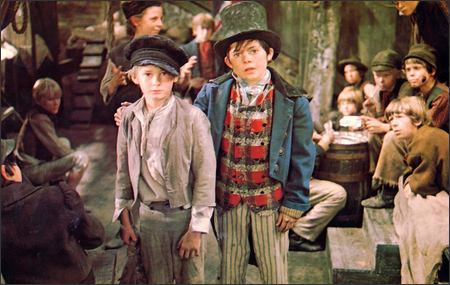OLIVER!
SUBJECTS — Drama/Musicals; Literature/England; World/England;
SOCIAL-EMOTIONAL LEARNING — Spousal Abuse; Crime;
MORAL-ETHICAL EMPHASIS — Caring.
AGE: 8+; MPAA Rating — G;
Musical; 1968; 145 minutes; Color.
There is NO AI content on this website. All content on TeachWithMovies.org has been written by human beings.

SUBJECTS — Drama/Musicals; Literature/England; World/England;
SOCIAL-EMOTIONAL LEARNING — Spousal Abuse; Crime;
MORAL-ETHICAL EMPHASIS — Caring.
AGE: 8+; MPAA Rating — G;
Musical; 1968; 145 minutes; Color.
TWM offers the following worksheets to keep students’ minds on the movie and direct them to the lessons that can be learned from the film.
Film Study Worksheet for ELA Classes and
Worksheet for Cinematic and Theatrical Elements and Their Effects.
Teachers can modify the movie worksheets to fit the needs of each class. See also TWM’s Movies as Literature Homework Project.
This is a musical version of Charles Dickens’ classic tale of life among the poor and criminal elements in London during the early 19th century.
Selected Awards:
1968 Academy Awards: Best Picture, Best Director (Reed), Best Art Direction/Set Decoration; Best Sound, Best Score; 1969 Golden Globe Awards: Best Film – Musical/Comedy, Best Actor – Musical/Comedy (Moody); 1968 National Board of Review Awards: Ten Best Films of the Year; 1968 Academy Award Nominations: Best Actor (Moody), Best Supporting Actor (Wild), Best Adapted Screenplay, Best Cinematography, Best Costume Design, Best Film Editing.
Featured Actors:
Mark Lester, Jack Wild, Ron Moody, Shani Wallis, Oliver Reed, Hugh Griffith.
Director:
Carol Reed.
“Oliver!” will introduce children to the 19th century London experienced by the poor. Nancy is beaten and then killed by her boyfriend when she tries to protect Oliver. This episode provides an opportunity to discuss spousal abuse.
MODERATE. Spousal abuse and the murder of a woman informant are shown. Alcohol use and abuse are shown.
Immediately after the movie, or at odd times over the next week (for example at the dinner table or in the car on the way to school) bring up some of the Discussion Questions, starting with the Quick Discussion Question. Don’t worry if you can only get through a few questions. Just taking the film seriously and discussing it is the key. Allow your child to watch the movie several times and continue to bring up discussion questions relating to the film.

Why did the children cling to Fagin? For a description of the oppressive system of treating the poor in England at the beginning of the nineteenth century, see Learning Guide to A Christmas Carol. The poor houses and orphanages were a part of that system. The children were required to work long hours and received precious little for it. The adult operators of these establishments often used them for their own profit. This was the life facing the Artful Dodger and the other children if they left Fagin.
1. Why did Bill Sykes beat Nancy?
2. Did the children have any choice other than to stay with Fagin and become pickpockets?
Discussion Questions Relating to Ethical Issues will facilitate the use of this film to teach ethical principles and critical viewing. Additional questions are set out below.
(Be kind; Be compassionate and show you care; Express gratitude; Forgive others; Help people in need)
1. Without caring people, what would have happened to Oliver?
All books by Dickens are excellent reading for older children who are good readers. Remind them that the novel is much richer and has more detail than the movie. Other books recommended for middle school and junior high readers include Charles Dickens: The Man Who Had Great Expectations by Diane Stanley & Peter Vennema.
This Learning Guide was last updated on December 17, 2009.